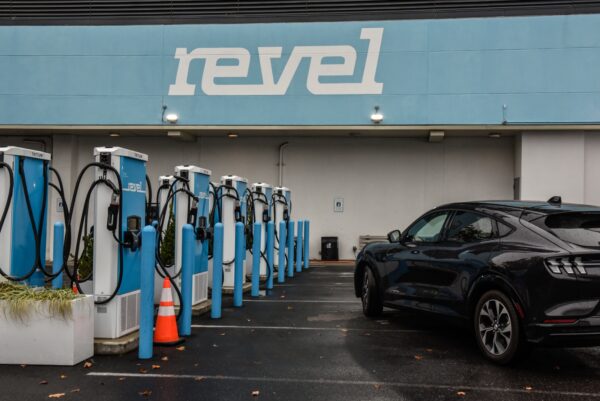By Gabrielle Coppola
On a recent trip to New York, I spent some time using Revel, the transportation service behind a fleet of Bugatti-blue Teslas darting around the city. After chatting up my driver — a veteran cabbie who raved about how soothing it was to navigate NYC chaos in silent, driver-assisted ease — we reached what I was really after: the startup’s Brooklyn charging hub.

With a former Pfizer chemical plant hovering above it and Marcy Houses — the childhood home of rapper Jay-Z — just across the street, the hub does more than supply electricity to cabbies, delivery trucks and the occasional New Yorker charging up for a long commute. It’s the realization of both social and environmental goals: bringing jobs and technology to a low-income area with a history of industrial pollution, and chipping away at the number of exhaust-spewing cars rumbling through the neighborhood.
It’s also attractive from a business case standpoint. With more than 1 million cab rides booked each day in New York City, Revel is betting the utilization rate of its charging hub will only increase as more motorists switch to battery-powered cars.
But what about the rest of the US — the highway strips and small towns that don’t have the population or the EV adoption rates to sustain such a station? That’s the chicken-and-egg problem that’s plagued the EV industry for years, and one Tesla has confronted head-on by funding its own vast network of charging stations.
Now the US government has taken up the mission, allocating billions of dollars to build out fast-charging networks across the country — first with $7.5 billion in the infrastructure bill that President Joe Biden signed into law a year ago, and more recently with investment tax credits for charging operators in the Inflation Reduction Act.
It can be difficult to grasp the full scale and ambition of these two pieces of legislation. The public got a glimpse when Biden and Transportation Secretary Pete Buttigieg showed up at the Detroit auto show in September, announcing they were ready to disburse the first chunk of infrastructure money to states to build fast-chargers along interstate highways. Buttigieg also highlighted $2.5 billion set aside to fund “community charging.”
“There are lot of neighborhoods, a lot of multi-family buildings — including areas with more low-income residents — where it may not yet be profitable for a company to put in an electric-vehicle charger,” he told reporters at the show. “We can help buy down that difference with this funding.”
Democrats aren’t just incentivizing electrification or global competitiveness with these two bills — they’re trying to address long-standing social problems. Electric vehicles are now seen as a panacea of sorts for everything from climate change to environmental discrimination. New EV plants could revitalize depressed areas and alleviate income inequality. Charging stations that support EVs could improve air quality in neighborhoods with high levels of air pollution and asthma.
These are laudable goals, but redressing decades of disenfranchisement won’t be easy. Denise Abdul-Rahman, an environment and climate-justice activist with the NAACP in Indiana — Buttigieg hails from South Bend — has been spearheading a campaign to pressure state officials to ensure some of the federal dollars for charging stations is invested in Black and minority neighborhoods.
Cities like Gary or Hammond housed steel mills, oil refineries and coal-fired power plants that poisoned the air and water. Abdul-Rahman believes this should put them first in line for EV investment.
“We we were left out of the first New Deal,” she said. “How do we make sure we’re in this New Deal?”
Abdul-Rahman says the Indiana Department of Transportation neglected these communities when it applied for federal grant money. Her coalition wants a commitment to contracts for minority-owned businesses, apprenticeships, and chargers in places like schools and churches to help generate revenue and expose people to new technology. And she’s pushing for public metrics to hold the state accountable to its goals.
Indiana’s transportation department says it does have minority business goals and is working on making its progress public. The federal grants are part of “an entirely new program and still evolving,” a spokeswoman said in an email. “There will be ongoing opportunities to make adjustments to the plan as we advance.”
While it’s still early for these projects, Abdul-Rahman says now’s the time to start fighting for resources.
“It’s not codified” that Black businesses and communities will get some of these resources, she said. That’s why it’s necessary to “build accountability at the beginning.”
More stories like this are available on bloomberg.com.




